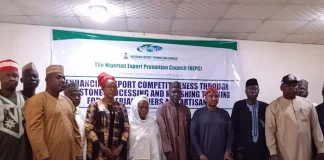The National Action Committee on African Continental Free Trade Area Agreement (AfCFTA) has identified insecurity, funding, infrastructure and regulatory constraints, production, productivity and predatory trade practices as some of the constraints to the success of intra-Africa free trade export.
The Senior Special Assistant to the President and Secretary, National Action Committee on AfCFTA, Francis Anatogu, during a media parley held in Lagos on Monday made this known.
He said some AfCFTA planned strategic programmes to support exporters include the N50bn Export Expansion Facility Programme and the N2.3tn National Economic Sustainability Plan for export driven economic growth, as well as the N1bn Nigeria-Africa Trade Investment Programme.
“The important thing to note is that these problems must be addressed to create jobs and grow our economy. So, AfCFTA is providing a much bigger market to sell our goods. There are areas where we have a comparative advantage,” Anatogu said.
According to him, the country aims to achieve economically viable communities in Nigeria by growing its intra-Africa export trade volume to $50bn by 2035.
READ ALSO: Livestock Sector Could Impact Nigeria’s Economy With N33trn – FG
Anatogu stated that other national AfCFTA aspirations were to establish a highly productive workforce, a business-friendly environment, quality infrastructure, export development incentives and a strong national brand.
According to him, Nigeria’s edge was being one of the most entrepreneurial, innovative and ingenious economies as well as the country’s scale of opportunities, quality of talent, scale of ambition and the adaptability and agility of the people.
Anatogu said, “Success with AfCFTA is a diversified and sustainable Nigerian economy with strong linkages with neighbours and the top economies in Africa and a globally accepted country brand.
“We are leveraging AfCFTA to prepare for a post-oil revenue driven society. The transformation transcends economic changes (includes mindset change).”
He stated that authorities to administer the rules of origin rules were being established and the concept had been agreed upon.
“Rules of origin means that for the products, if they are not made 100 per cent in Africa, they do not qualify and in others if they do not meet the rules of substantial transformation, they also do not qualify,” he said.
READ ALSO: Crown Flour Mill Explores Opportunities For Wheat Development In Nigeria
“And this will guide the AfCFTA agreement. It does not mean that those products cannot come in, but they cannot benefit from the packages in the agreement.”
Anatogu said concerns about competitiveness were being addressed by the federal government.
He said the key challenges to achieving the targets were insecurity, funding, infrastructure and regulatory constraints, production and productivity issues as well as predatory trade practices.
Anatogu said some AfCFTA strategic programmes underway were the N50bn Export Expansion Facility Programme and the N2.3tn National Economic Sustainability Plan for export driven economic growth, as well as the N1bn Nigeria-Africa Trade Investment Programme.













